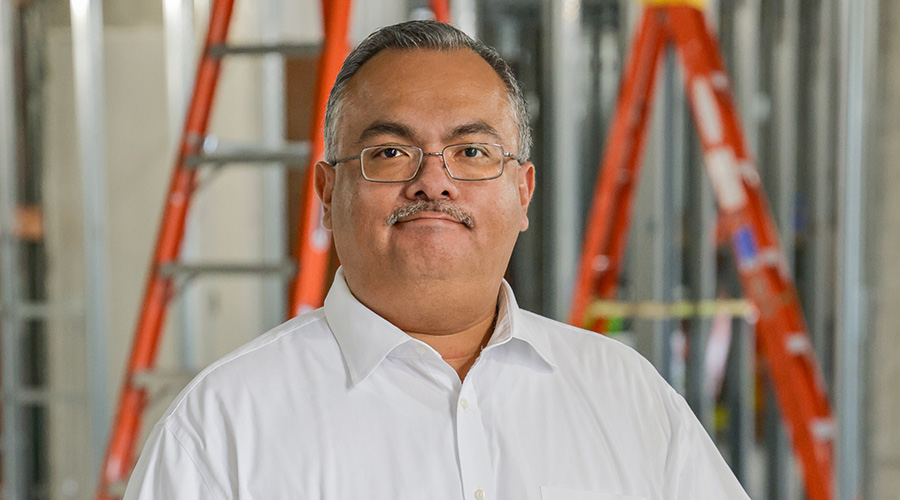VICE PRESIDENT OR DIRECTOR OF FACILITIES
Median salary: $90,000
Range: $40,000 to $250,000
Median Salary by Certification:
With certification: $93,000
Without certification: $84,000
Median Salary by Education:
With Bachelor’s or higher: $95,000
Without Bachelor’s: $71,000
Median Salary by Facility Size:
Less than 1 million sq. ft.: $80,200
1 million sq. ft. or more: $102,000
Median Salary by Facility Budget:
Below $20 million: $83,000
Above $20 million: $125,000
Median Salary by Experience:
Less than 9 years: $85,000
9 to 15 years: $80,000
16 years or more: $98,000
Median Salary by Staff Size:
Less than 25: $78,000
25 to 99: $85,750
100 or more: $100,000
Salary Snapshot
Facilities Vice President or Director responsible for 1-2 million sq. ft. of medical space in Michigan with a budget of $1-$5 million and a staff of 50-99. Does not have certification. Master’s in liberal arts, 25 years or more experience. Salary: $116,000
VICE PRESIDENT OR DIRECTOR OF REAL ESTATE
Median salary: $100,000
Range: $50,000 to $310,000
Salary Snapshot
Vice President or Director of Real Estate responsible for 500,000-1 million sq. ft. of corporate office space in New Jersey with a budget of less than $1 million and a staff of 1-5. Has certification, Bachelor’s in business, 25 years or more experience. Salary: $125,000
VICE PRESIDENT OR DIRECTOR OF FACILITY ENGINEERING
Median salary: $80,000
Range: $50,000 to $220,000
Salary Snapshot
Vice President or Director of Maintenance Engineering responsible for 500,000-1 million sq. ft. of hospitality space in Florida with a budget of $5-$10 million and a staff of 1-5. Does not have certification or Bachelor’s degree. 25 years or more experience. Salary: $106,000
VICE PRESIDENT OR DIRECTOR OF MAINTENANCE ENGINEERING
Median salary: $68,000
Range: $35,000 to $150,000
Salary Snapshot
Vice President or Director of Facility Engineering responsible for 100,000-250,000 sq. ft. of medical space in California with a budget of $10-$20 million and a staff of 25-49. Has certification, does not have a degree. 20-24 years experience. Salary: $88,000
VICE PRESIDENT OR DIRECTOR OF BUILDINGS AND GROUNDS
Median salary: $60,000
Range: $42,000 to $80,000
Salary Snapshot
Vice President or Director of Buildings and Grounds responsible for 100,000-250,000 sq. ft. of K-12 space in Utah with a budget of $1-$5 million and a staff of 25-49. Does not have certification. Bachelor’s in liberal arts, 12-15 years experience. Salary: $64,000
DIRECTOR OF PHYSICAL PLANT
Median salary: $75,000
Range: $34,000 to $120,000
Salary Snapshot
Director of Physical Plant responsible for 500,000-1 million sq. ft. of municipal government space in Michigan with a budget of $1-$5 million and a staff of 25-49. Does not have certification. Associate’s in interior design, 12-15 years experience. Salary: $82,000
ASSISTANT DIRECTOR OF PHYSICAL PLANT
Median salary: $57,500
Range: $30,000 to $90,000
Salary Snapshot
Assistant Director of Physical Plant responsible for 2-3 million sq. ft. of higher education space in Texas with a budget of $1-$5 million and a staff of 50-99. Does not have certification. PhD in facility management, 25 years or more experience. Salary: $78,000
BUILDINGS AND GROUNDS SUPERINTENDENT
Median salary: $42,000
Range: $21,000 to $90,000
Salary Snapshot
Buildings and Grounds Superintendent responsible for 5 million or more sq. ft. of higher education space in Georgia with a budget of $40-$50 million and 13-24 staff. Has certification, Bachelor’s in facility management, 20-24 years experience. Salary: $53,000
FACILITY OR BUILDING MANAGER
Median salary: $60,000
Range: $24,000 to $138,000
Median Salary by Certification:
With certification: $70,000
Without certification: $56,000
Median Salary by Education:
With Bachelor’s or higher: $63,250
Without Bachelor’s: $57,000
Median Salary by Facility Size:
Less than 1 million sq. ft.: $60,000
1 million sq. ft. or more: $74,000
Median Salary by Facility Budget:
Below $20 million: $60,000
Above $20 million: $83,500
Median Salary by Experience:
Less than 9 years: $52,000
9 to 15 years: $60,000
16 years or more: $72,000
Median Salary by Staff Size:
Less than 25: $56,000
25 to 99: $74,000
100 or more: $88,000
Salary Snapshot
Facility or Building Manager responsible for 250,000-500,000 sq. ft. of corporate office space in Virginia with a budget of $5-$10 million and a staff of 1-5. Does not have certification. Master’s in business, 16-19 years experience. Salary: $85,000
ENERGY MANAGER
Median salary: $52,500
Range: $30,000 to $80,000
Salary Snapshot
Energy Manager responsible for less than 100,000 sq. ft. of medical space in New York with a budget of less than $1 million and no staff. Does not have certification. Master’s in facility management, less than one year experience. Salary: $60,000
|
PROJECT MANAGER
Median salary: $64,750
Range: $37,000 to $109,000
Salary Snapshot
Project Manager responsible for 1-2 million sq. ft. of corporate office space in Illinois with a budget of $10-$20 million and a staff of 25-49. Has certification. Bachelor’s in engineering, 20-24 years experience. Salary: $75,000
PLANT OR OPERATIONS MANAGER
Median salary: $70,000
Range: $28,000 to $105,000
Salary Snapshot
Plant or Operations Manager responsible for 1-2 million sq. ft. of leased commercial space in Oregon with a budget of $5-$10 million and a staff of 50-99. Does not have certification. Associate’s in engineering, 25 or more years experience. Salary: $80,000
MAINTENANCE MANAGER
Median salary: $50,000
Range: $25,000 to $140,000
Salary Snapshot
Maintenance Manager responsible for 5 million or more sq. ft. of K-12 space in Texas with a budget of less than $1 million and a staff of 25-49. Has certification, Associate’s in engineering, 16-19 years experience. Salary: $65,000
ASSET MANAGER
Median salary: $76,000
Range: $30,000 to $115,000
Salary Snapshot
Asset Manager responsible for 100,000-250,000 sq. ft. of corporate office space in California with a budget of $5-$10 million and a staff of 1-5. Has certification, Master’s in business, 16-19 years experience. Salary: $95,000
SENIOR PROPERTY MANAGER
Median salary: $74,000
Range: $32,000 to $108,000
Salary Snapshot
Senior Property Manager responsible for 5 million or more sq. ft. of K-12 space in Maryland with a budget of $50 million or more and a staff of 300 or more. Has certification, Master’s in architecture, 12-15 years experience. Salary: $79,000
PROPERTY MANAGER
Median salary: $58,625
Range: $25,000 to $108,000
Median Salary by Certification:
With certification: $62,000
Without certification: $51,250
Median Salary by Education:
With Bachelor’s or higher: $60,000
Without Bachelor’s: $52,000
Median Salary by Facility Size:
Less than 1 million sq. ft.: $53,000
1 million sq. ft. or more: $77,000
Median Salary by Facility Budget:
Below $20 million: $56,125
Above $20 million: $75,100
Median Salary by Experience:
Less than 9 years: $50,000
9 to 15 years: $70,000
16 years or more: $63,000
Median Salary by Staff Size:
Less than 25: $53,000
25 to 99: $74,500
100 or more: $68,125
Salary Snapshot
Property Manager responsible for 500,000-1 million sq. ft. of retail space in Kentucky with a budget of $1-$5 million and a staff of 50-99. Does not have certification or Bachelor’s degree. 4-8 years experience. Salary: $75,000
ASSISTANT PROPERTY MANAGER
Median salary: $42,000
Range: $23,000 to $55,000
Salary Snapshot
Assistant Property Manager responsible for 100,000-250,000 sq. ft. of corporate office space in Virginia with a budget of $1-$5 million and a staff of 1-5. Does not have certification. Bachelor’s in business, 1-3 years experience. Salary: $49,000
FACILITY COORDINATOR/SUPERVISOR
Median salary: $45,000
Range: $18,000 to $85,000
Median Salary by Certification:
With certification: $57,500
Without certification: $44,000
Median Salary by Education:
With Bachelor’s or higher: $50,000
Without Bachelor’s: $45,500
Median Salary by Facility Size:
Less than 1 million sq. ft.: $43,000
1 million sq. ft. or more: $56,250
Median Salary by Facility Budget:
Below $20 million: $44,000
Above $20 million: $62,500
Median Salary by Experience:
Less than 9 years: $43,000
9 to 15 years: $50,000
16 years or more: $51,000
Median Salary by Staff Size:
Less than 25: $43,000
25 to 99: $54,250
100 or more: $67,500
Salary Snapshot
Facility Coordinator/Supervisor responsible for 2-3 million sq. ft. of medical space in Wisconsin with a budget of $50 million or more and a staff of 6-12. Has certification. Bachelor’s in interior design, 9-12 years experience. Salary: $55,000
SPACE PLANNER
Median salary: $50,000
Range: $29,000 to $85,000
Salary Snapshot
Space Planner responsible for 5 million or more sq. ft. of state government space in Minnesota with a budget of $50 million or more and a staff of 13-24. Does not have certification. Bachelor’s in architecture, 12-15 years experience. Salary: $54,000
CHIEF ENGINEER
Median salary: $65,000
Range: $48,000 to $108,000
Salary Snapshot
Chief Engineer responsible for 1-2 million sq. ft. of hospitality space in Georgia with a budget of $1-$5 million and a staff of 25-49. Does not have certification. Associate’s in engineering, 16-19 years experience. Salary: $79,000
BUILDING OR FACILITY ENGINEER
Median salary: $55,000
Range: $21,000 to $140,000
Salary Snapshot
Maintenance Engineer responsible for 100,000-250,000 sq. ft. of K-12 space in Minnesota with a budget of less than $1 million and no staff. Does not have certification or degree. 4-8 years experience. Salary: $40,000
MAINTENANCE SUPERVISOR
Median salary: $47,500
Range: $21,000 to $96,000
Salary Snapshot
Maintenance Supervisor responsible for 5 million or more sq. ft. of medical space in Texas with a budget of $50 million or more and a staff of 25-49. Has certification, does not have a degree. 9-12 years experience. Salary: $53,500
MAINTENANCE TECHNICIAN
Median salary: $41,500
Range: $22,000 to $80,000
Salary Snapshot
Maintenance Technician responsible for 5 million or more sq. ft. of higher education space in California with a budget of $40-$50 million and a staff of 25-49. Does not have certification. Bachelor’s in facility management, 25 years or more experience. Salary: $54,000
|










